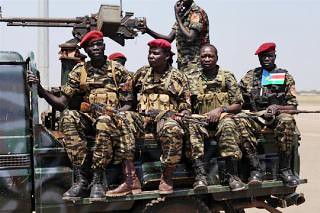
South Sudan troops on patrol. The soldiers have taken back the capital of Unity state on January 10, 2014., a photo by Pan-African News Wire File Photos on Flickr.
TUESDAY 21 JANUARY 2014
Jonglei displaced agree to be relocated by E. Equatoria government
By Ijoo Bosco
January 20, 2013 (TORIT) - The Madi Community of Magwi county has refused to allocate land on a temporary basis to house some of the people displaced from the conflict in Jonglei state and other parts of the South Sudan.
Eastern Equatoria’s state deputy governor Jerome Gama Surur, who led a high-level delegation to Nimule payam [district] of Magwi county, said that Madi elders had refused to provide land to the internally displaced due to congestion in the area.
Surur said their assessment and consultation with the authorities in Nimule and the community in Magwi county had yielded few positive responses given the scarcity of space, other than sleeping in schools, churches and small open places.
The deputy governor said that the government has offered to transport the internally displaced people (IDPs) to other areas of Eastern Equatoria, including Kapoeta South and Torit county.
The proposed alternatives have been accepted by the internally displaced communities, Surur said, adding that the other areas have the space to help accommodate them for some time.
After visiting Magwi county Surur and his accompanying delegation returned to Torit to brief an extraordinary council of Eastern Equatoria’s ministers on Monday chaired by the state governor Louis Lobong Lojore.
Eastern Equatoria’s minister of information, Clement Laku Chichim, reiterated that, the extraordinary meeting discussed how to cope with the increasing numbers displaced people still arriving from Jonglei state to the north where rebels have been fighting the government for over a month.
Laku urged the communities in Torit and Kapoeta South to be welcoming to the displaced people so they can live in harmony until it is safe enough for them to return to their homes.
Of the over half a million people who have been forced from their homes during the last six weeks of fighting over 50,100 are in Eastern Equatoria according to the United Nations Office for the Coordination of Humanitarian Affairs (UNOCHA).
(ST)
No comments:
Post a Comment